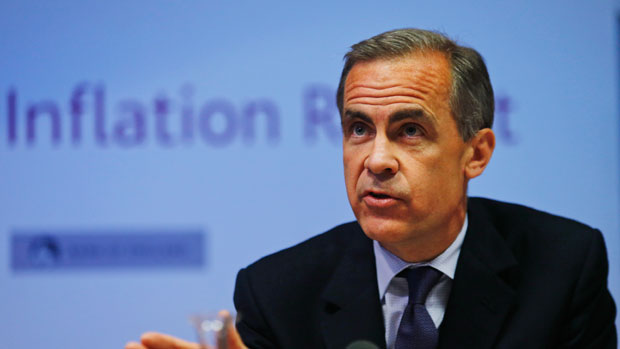Mark Carney laments 'first lost decade since 1860'
Bank of England governor says ultra-loose policy has protected 1.5 million jobs

A free daily email with the biggest news stories of the day – and the best features from TheWeek.com
You are now subscribed
Your newsletter sign-up was successful
Britain is experiencing "its first lost decade since 1860", according to the Bank of England's governor Mark Carney, says the Daily Telegraph.
In a speech in Liverpool that The Times says "amounted to a manifesto for a new capitalism", Carney also warned that over the past ten years "real earnings have grown at the slowest rate since the mid-19th century".
The Canadian financier warned of a growing backlash against globalisation, which for many have become "associated with low wages, insecure employment, stateless corporations and striking inequalities".
The Week
Escape your echo chamber. Get the facts behind the news, plus analysis from multiple perspectives.

Sign up for The Week's Free Newsletters
From our morning news briefing to a weekly Good News Newsletter, get the best of The Week delivered directly to your inbox.
From our morning news briefing to a weekly Good News Newsletter, get the best of The Week delivered directly to your inbox.
But this was not an argument against globalisation or free trade – far from it. Carney said it would be "a tragedy" if the western world turned "our backs on open markets".
In the wake of the Brexit vote, the election of Donald Trump and the recent referendum defeat of Italian Prime Minister Matteo Renzi, he said politicians had to foster "a globalisation that works for all".
Governments must "redistribute some of the gains from trade and technology", as well as drive productivity improvements through, for example, upskilling workers.
More pressingly, and to restore "trust" in the system, governments need to tackle the rise of "stateless corporations" – and ensure that companies are "rooted and pay tax somewhere".
A free daily email with the biggest news stories of the day – and the best features from TheWeek.com
Given his clash in the summer with Theresa May, Carney's comments could be seen as confrontational. This is especially true of one passage of his speech, where he defended central bank policy since the financial crisis.
Carney said that if the Bank of England had not dropped interest rates to near-zero – and held them there for nine years and counting – 1.5 million more people would be unemployed and real wages would be £2,000 a year lower.
"The data do not support the idea that the period of low rates has benefited the wealthiest at the expense of the least wealthy," he said.
"All monetary policy has distributional effects, but it is rightly the role of elected governments to take measures to offset them if they so choose."
-
 Why is the Trump administration talking about ‘Western civilization’?
Why is the Trump administration talking about ‘Western civilization’?Talking Points Rubio says Europe, US bonded by religion and ancestry
-
 Quentin Deranque: a student’s death energizes the French far right
Quentin Deranque: a student’s death energizes the French far rightIN THE SPOTLIGHT Reactions to the violent killing of an ultra-conservative activist offer a glimpse at the culture wars roiling France ahead of next year’s elections.
-
 Secured vs. unsecured loans: how do they differ and which is better?
Secured vs. unsecured loans: how do they differ and which is better?the explainer They are distinguished by the level of risk and the inclusion of collateral
-
 Labour shortages: the ‘most urgent problem’ facing the UK economy right now
Labour shortages: the ‘most urgent problem’ facing the UK economy right nowSpeed Read Britain is currently in the grip of an ‘employment crisis’
-
 Will the energy war hurt Europe more than Russia?
Will the energy war hurt Europe more than Russia?Speed Read European Commission proposes a total ban on Russian oil
-
 Will Elon Musk manage to take over Twitter?
Will Elon Musk manage to take over Twitter?Speed Read The world’s richest man has launched a hostile takeover bid worth $43bn
-
 Shoppers urged not to buy into dodgy Black Friday deals
Shoppers urged not to buy into dodgy Black Friday dealsSpeed Read Consumer watchdog says better prices can be had on most of the so-called bargain offers
-
 Ryanair: readying for departure from London
Ryanair: readying for departure from LondonSpeed Read Plans to delist Ryanair from the London Stock Exchange could spell ‘another blow’ to the ‘dwindling’ London market
-
 Out of fashion: Asos ‘curse’ has struck again
Out of fashion: Asos ‘curse’ has struck againSpeed Read Share price tumbles following the departure of CEO Nick Beighton
-
 Universal Music’s blockbuster listing: don’t stop me now…
Universal Music’s blockbuster listing: don’t stop me now…Speed Read Investors are betting heavily that the ‘boom in music streaming’, which has transformed Universal’s fortunes, ‘still has a long way to go’
-
 EasyJet/Wizz: battle for air supremacy
EasyJet/Wizz: battle for air supremacySpeed Read ‘Wizz’s cheeky takeover bid will have come as a blow to the corporate ego’